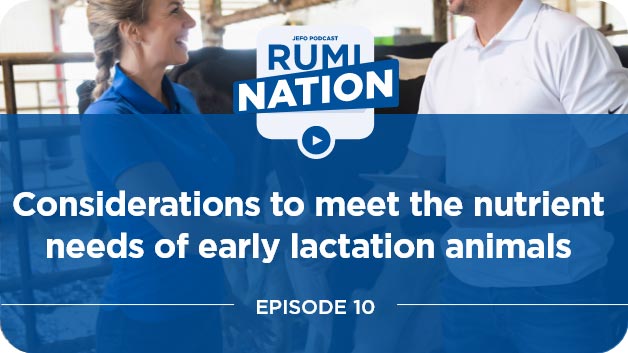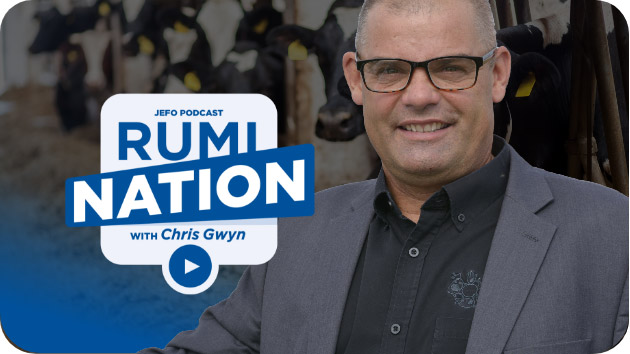RumiNation | S03 : E11
Stress: How Does Gut Health Respond?
Brought to you by Jefo Nutrition
Share now!
Did you enjoy this episode?
Share now!
Our guest - Dr. Lance Baumgard
Dr. Lance Baumgard is an American physiologist, currently the Norman L. Jacobson Endowed Professor in Nutritional Physiology at Iowa State University. His primary research emphasis has been on the metabolic and endocrine consequences of heat stress in growing and lactating animals. Lance and his research team have made several novel discoveries with regards to changes in carbohydrate, lipid, and protein metabolism during heat stress. These previously unexplained changes in post-absorptive nutrient partitioning reduce milk yield more than reduced feed intake and negative energy balance predict.

Timestamps & Summary
1:47
What brought you to that area of research?
Dr. Lance Baumgard
When I was at the University of Arizona, we started working on heat stress. And through a series of experiments over a period of about 10 years, we middle our way down to the gut. And what we are very confident in is that most of the negative consequences of heat stress on all farm animals stem from what we generally refer to as a leaky gut. When an animal becomes heat stress, there is a diversion of blood and, the barrier function of the gut breaks down. Now, unwanted molecules, antigens and pathogens can get in and cause a host of all sorts of negative problems.
Then, we started to notice, almost by accident, that many of the negative consequences of heat stress, the metabolic, the endocrine, and the inflammatory responses are very similar to other pathologies or other negative problems that are typical on a farm. So, since then, we have looked at other very common on farm issues that cause leaky gut. And that is what we have been concentrating on lately.
4:02
In a recent presentation at the Animal Nutrition Conference in Saskatoon back in May, “when your gut isn’t happy, you’re not happy” was a quote that you have used. Can you explain more the biology behind that?
Dr. Lance Baumgard
It is a very common problem in humans, about 1/3 of the adult population of humans has a gut barrier problem. Crohn’s disease, celiac, colitis, these are all different pathologies, but the result is too much in infiltration of immune cells into the gut, leading to hyper permeability, or in other words, more antigens leaking out, and stimulate an immune response, be it bloating or any other uncomfortable or painful situation.
6:25
I was hoping to talk about how stress relates to that. I wonder what the impact of stress or stressors and strain as in the gut health of animals?
Dr. Lance Baumgard
That is fascinating emerging area led by a good friend of mine named Adam Moser, veterinarian PhD from Michigan State University. He has done a fantastic job characterizing how emotional stress is connected to your gut. How that works is, when you get stressed, you release this hormone called corticotropin releasing hormone. Most of your neurons are in your gut. And they communicate with your immune cells, called mast cells. When you get stressed, this hormone causes these mast cells to release a variety of different compounds, and those compounds then cause the gut barrier, that would normally be tight, to be leaky.
The immune system has a very high priority for all animals. It might even have a larger importance than the central nervous system. So, in other words, when an animal becomes sick, it will prioritize the immune system over all other functions: making of milk, making them a fetus making of wool, making a muscle. When the animal becomes sick, infected by the gut or any other infection, now the immune systems is top of the list when it comes to priorities, and nutrients that would otherwise have gone for the synthesis of milk or what other function is now being partitioned towards the immune system.
10:25
And this is the link where some of these subclinical immune challenges on a dairy farm, whether it is health, high somatic cells, mastitis, uterine infections, they are just not as productive as they could be, right?
Dr. Lance Baumgard
That is exactly right, Chris. It is probably not a problem for most of the cows. But for this small percentage of cows that are not able to eat when they want to eat, or they are not able to lay down when they want to lean down or get bossed around, they are having this emotional response. And that comes at the cost of milk.
12:07
What are take home messages for researchers, nutritionists, veterinarians, and producers in relates to gut health and ruminants?
Dr. Lance Baumgard
We are starting to realize that gut is very important. And luckily, the industry, including companies like JEFO, is trying to identify compounds and target molecules and strategies to help maintain good health. So, this is at the infancy, but I think it is just a matter of time before we start dialing in on strategies to help maintain good health.






